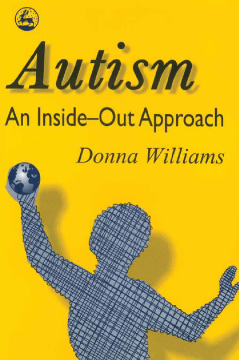
Additional Information
Book Details
Abstract
Donna Williams' challenging book, written by an autistic person for people with autism and related disorders, carers, and the professionals who work with them, is a practical handbook to understanding, living with and working with autism. Exploring autism from the inside, it shows clearly how the behaviours associated with autism can have a range of different causes, and in many cases reflect the autistic person's attempt to gain control over their internal world. The sensory and perceptual problems that challenge a person with autism are described in depth, together with strategies for tackling them so as to enable that person to take more control of their lives. Donna Williams comments on the various approaches to autism, drawing out those strategies that are of real use, and explaining why some approaches may prove counterproductive, leaving the autistic person feeling even more isolated and misunderstood.
Taking the view that understanding autism is the key to managing the condition, Donna Williams' book will bring illumination to all those who have felt baffled and frustrated by the outside appearance of autism. It contains a wealth of helpful suggestions, insights and new ideas, exploding old myths and promoting a view that all those involved with autism will find empowering and creative.
I found Donna Williams' book invaluable. It is a book that works to integrate what is needed and what it feels like from the inside of autism. I shall refer to it to help me think of how someone with autism may be experiencing their work and shall certainly recommend it to parents and other professionals.
The Canadian Child Psychiatry Review
Donna Williams was born in Australia in 1963. She was assessed at age two as psychotic, labelled disturbed and tested for deafness throughout childhood before being diagnosed as autistic in 1990. She was an international best-selling author with nine published books, an artist, singer-songwriter and screenwriter. One of the most well known people with autism in the world, Donna was a renowned international public speaker, a qualified teacher and worked as an autism consultant.
A book written by someone who has experienced the difficulties from the inside must give rare insight into the living with autism. For Occupational Therapists one of the greatest values of Donna Williams' book is that she looks at many different aspects, particularly the sensory problems, and relates theory to everyday living. She describes most of the treatment approaches available and judges their value from her own experience and from a sound theoretical basis. Donna Williams' book gives insight into autism and brings hope. She makes us look again and see that more can be achieves if the difficulties are understood better and more appropriate help given. It is a book that empowers the reader and rekindles enthusiasm. Well worth buying. It is well worth reading the whole book but it is also a volume that you can dip into. If you can't buy this book then borrow it. Anyone working with autism needs to know what this remarkable woman is telling us.
NAPOT Journal
Autism: An Inside-Out Approach is an insightful look at autism that goes beyond symptoms and behaviors. This book is written by an eloquent author who lives with autism every day. Donna Williams suggests both detailed theory and practical day-to-day strategies for addressing specific challenges of individuals who, like her, have some type of autism or Asperger syndrome. Williams uses her initial chapters to tell her story and to set up her general theory… Autism: An Inside-Out Approach is a must read for all professionals and care-givers in the field of autism. It is thought provoking and dense with practical real-world suggestions and strategies. Readers must be cautious, however, because Williams' theories are the personal beliefs of an individual with autism, based on her own unique life experiences. She offers little scientific support for her ideas, and yet many will ring true with anyone who knows individuals with these characteristics. Many scientific studies have come and gone over the years, without having a significant impact on the type of support that is given to persons who have autism. Not just despite its subjectivity and personal nature, but because of it, this articulate approach by someone who has lived with autism may affect the ways in which professionals approach autism for years to come.
Focus on Autism and Other Developmental Disabilities
